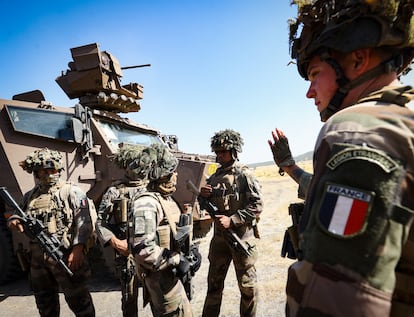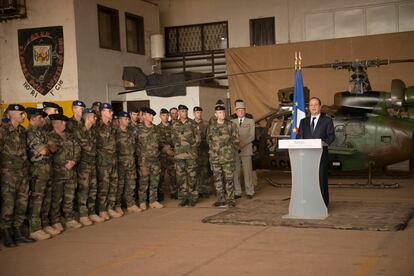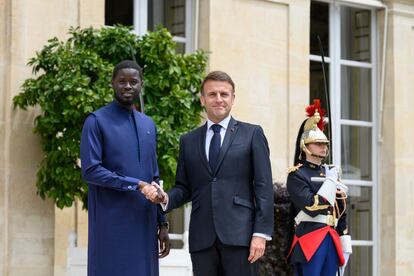From 10,000 to 2,000 soldiers in five years: France’s decline in Africa accelerates
A wave of sovereignty and the emergence of new actors such as Russia, China, and Turkey have pushed Paris out from its main zone of influence in the Sahel

On February 2, 2013, then-French President François Hollande was welcomed as a liberator in the Malian cities of Bamako and Timbuktu, after a rapid military intervention led by Paris succeeded in dislodging the jihadists from the main cities in the north of the country. Eleven years later, the former heroes are now being driven out of Africa by a wave of sovereignty which, together with the emergence of new actors such as Russia, Turkey, and China, aims to banish the enormous French influence and interventionism from the continent: of the 10,000 soldiers present in Africa just five years ago, barely 4,000 remain, and it is expected that this number will be reduced to less than 2,000 in the coming months following recent announcements by Chad and Senegal.
On Tuesday, two French fighter planes took off from the Adji Kossei base in Chad, heading for France. This is the first step in the withdrawal of French troops from the country after the Chadian government announced on November 28 that it had broken the military agreement that protected the presence of 1,000 French soldiers on its territory. That same day, Senegalese President Bassirou Diomaye Faye advocated the closure of the only French military base in his country.
These are the last pieces of a domino effect that, according to Dagauh Komenan, a doctor in contemporary history and specialist in the Sahel, began to fall in 2017. “Sometimes we forget that the Central African Republic was the first link. France decides to end Operation Sangaris and Russia takes advantage of this vacuum to inaugurate its new doctrine in Africa with the private company Wagner and the control of minerals,” he says.
The French military presence dates back to the years immediately after independence. Many governments in African countries that had been French colonies signed agreements with the former mother country to ensure their survival in the face of opposition rebels and coups d’état. With just 10,000 troops spread across a handful of countries, France was able to intervene militarily on up to 30 occasions between 1964 and 2012, the golden age of this complex web of relations marked by neocolonial interference known as Françafrique, during which Paris managed to maintain its influence on the continent. But times have changed.
In the late 1990s, the Ivorian reggae musician Alpha Blondy was already singing openly: “French army, get out! / Get out of our home / We don’t want independence anymore / under high surveillance.” A new generation of citizens was emerging across the continent, demanding a deeper sovereignty movement, which has now crystallized into political and social movements. “The abnormality represented by France’s paternalistic relationship with its former colonies has come to the forefront of the debate,” says Jesús Pérez Triana, coordinator of the analysis website Osint Sahel. “We are at a time of paradigm shift, not only in the military, but also in the economic.”

Of those 10,000 soldiers, more than half of whom were deployed in the Sahel with Operation Barkhane, today there are about 4,000 left. The main French base, with 1,500 troops, is in Djibouti, a strategic logistical and operational platform overlooking a key maritime route in world trade and from where it is possible to intervene in a short time not only in Africa, but also in the Middle East and the Indian Ocean. Behind it, the most robust presence is in Chad, with 1,000 troops, the last bastion of its action in the Sahel after its forced departure from Mali, Niger, and Burkina Faso, where they have been replaced by Russian soldiers and mercenaries. In fact, the breaking of the military agreement made public by N’Djamena took Paris by surprise.
“On October 28, Boko Haram attacked a military base in the Lake Chad area and killed about 40 soldiers. The army responded, but did not receive support from France. They felt they had been left alone,” says Komenan. For Pérez Triana, Chadian President Mahamat Idriss Déby is more interested in acquiring military equipment from Turkey, China, or Russia, such as the latest generation of drones, than maintaining a model of military cooperation that does not contribute to his fight against terrorism. “France is not on the front line against jihad in Chad because this has a high internal political cost, it no longer brings any benefits,” explains the expert.
Following its expulsion from Mali, Burkina Faso, and Niger between 2021 and 2024 by the new military juntas, largely motivated by the failure of Operation Barkhane against an increasingly widespread jihadism, and amid the growing wave of sovereignty sweeping through Africa, France itself had undertaken a plan to reduce its military presence on the continent. At the end of November, French Foreign Minister Jean-Marie Bockel handed President Emmanuel Macron a plan detailing the reconfiguration of its military apparatus.

The mission in Djibouti, intact
Although official figures have not been released because they are classified information, various French media outlets reported during the summer that the plan was to reduce the number by half, from around 4,000 to around 2,000. Only the base in Djibouti would remain intact. “They wanted to show that they are leaving, not that they are being thrown out,” says Pérez Triana. But the announcement by Chad and Senegal “has been a blow to their national pride and international prestige,” concludes Komenan.
In Dakar, President Faye’s decision to close the Ouakam base will affect some 350 soldiers. However, its impact is more symbolic than operational. Senegal has always been a staunch ally, but the arrival in power of Pastef, a party that has made sovereigntist and pan-Africanist discourse its banner, made it likely that a decision would be made in this direction. With their departure, the 100 French soldiers stationed in the Ivory Coast (currently 600, but Paris plans to reduce them) will be the only troops left in West Africa. The debate on their presence in this territory will soon spread, especially in view of the 2025 elections. There are also about 350 troops in Gabon, which the Élysée wants to reduce to around 100.
“Despite his dismay, Macron’s name will go down in history, among other things, for being the one who let go of French influence in Africa,” says Komenan. “Not only are Africans rethinking France’s role, but the French are rethinking their neocolonial logic. It is a change in the balance of power. The African armies of the 1980s and 1990s were fed by French material, doctrine, and even esthetics, but now there are other sources of supply, a market in which Paris is not present. The feeling that the French military presence is unacceptable also comes from there,” Pérez Triana concludes.
Sign up for our weekly newsletter to get more English-language news coverage from EL PAÍS USA Edition
Tu suscripción se está usando en otro dispositivo
¿Quieres añadir otro usuario a tu suscripción?
Si continúas leyendo en este dispositivo, no se podrá leer en el otro.
FlechaTu suscripción se está usando en otro dispositivo y solo puedes acceder a EL PAÍS desde un dispositivo a la vez.
Si quieres compartir tu cuenta, cambia tu suscripción a la modalidad Premium, así podrás añadir otro usuario. Cada uno accederá con su propia cuenta de email, lo que os permitirá personalizar vuestra experiencia en EL PAÍS.
¿Tienes una suscripción de empresa? Accede aquí para contratar más cuentas.
En el caso de no saber quién está usando tu cuenta, te recomendamos cambiar tu contraseña aquí.
Si decides continuar compartiendo tu cuenta, este mensaje se mostrará en tu dispositivo y en el de la otra persona que está usando tu cuenta de forma indefinida, afectando a tu experiencia de lectura. Puedes consultar aquí los términos y condiciones de la suscripción digital.









































